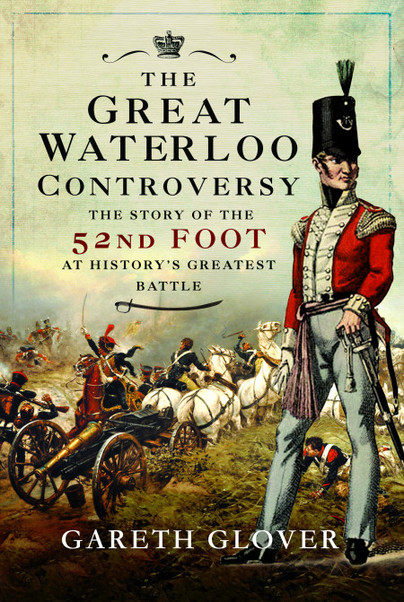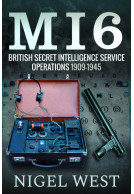The Great Waterloo Controversy (Hardback)
The Story of the 52nd Foot at History's Greatest Battle
(click here for international delivery rates)
Order within the next 11 hours, 24 minutes to get your order processed the next working day!
Need a currency converter? Check XE.com for live rates
| Other formats available | Price |
|---|---|
| The Great Waterloo Controversy Paperback Add to Basket | £11.99 |
| The Great Waterloo Controversy ePub (27.3 MB) Add to Basket | £6.99 |
As the Battle of Waterloo reached its momentous climax, Napoleon’s Imperial Guard marched towards the Duke of Wellington’s thinning red line. The Imperial Guard had never tasted defeat and nothing, it seemed, could stop it smashing through the British ranks. But it was the Imperial Guard that was sent reeling back in disorder, its columns ravaged by the steady volleys of the British infantry.
The credit for defeating the Imperial Guard went to the 1st Foot Guards, which was consequently honoured for its actions by being renamed the Grenadier Guards. The story did not stop there, however, as the 52nd Foot also contributed to the defeat of the Imperial Guard yet received no comparable recognition.
The controversy of which corps deserved the credit for defeating the Imperial Guard has continued down the decades and has rightly become a highly contentious subject over which much ink has been spilled. But now, thanks to the uncovering of the previously unpublished journal of Charles Holman of the 52nd Foot, Gareth Glover is able to piece together the exact sequence of events in those final, fatal moments of the great battle.
Along with numerous other first-hand accounts, Gareth Glover has been able to understand the most likely sequence of events, the reaction to these events immediately after the battle and how it was seen within the army in the days after the victory. Who did Wellington honour at the time? How did the Foot Guards gain much of the credit in London? Was there an establishment cover-up? Were the 52nd robbed of their glory? Do the recent much-publicised arguments stand up to impartial scrutiny? The Great Waterloo Controversy is the definitive answer to these questions and will finally end this centuries-old conundrum.
The Great Waterloo Controversy is both a well written narrative and an analysis of the defeat of the Imperial Guard...Students of Waterloo will enjoy this book.
Beating Tsundoku
Read the Full Review Here
Alongside original maps and personal records from soldiers, the Author narrates the course of the battle, breaking it down into hourly and daily segments, allowing you to understand the ebb and flow of the troops and the difficulties encountered under terrible conditions.
Army Rumour Service (ARRSE)
Read the full review here
Featured on the website of
Portsmouth Napoleonic Society
This book rights a wrong at one of the great battles of history, by recognizing the part played by the 52nd Foot in throwing back Napoleon’s last throw of the dice. The Foot Guards were recognized for their part in breaking Napoleon’s Imperial Guard but the 52nd Foot were overlooked – Very Highly Recommended
Firetrench
Read the full review here
After more than forty years of meticulous research the author is acknowledged as the foremost authority on the Napoleonic Wars, and Waterloo in particular, and is author of the monumental and highly acclaimed “Waterloo Archive” series. In The Great Waterloo Controversy, Gareth Glover focuses on the defeat of Napoleon’s Imperial Guard at the height of the Battle which turned the tide in favour of the Allies and for which the credit was mostly given to the 1st Foot Guards who were renamed The 1st or Grenadier Regiment of Foot Guards in honour of their actions. It has been a source of controversy and frustration that the actions of the Light Brigade in this phase of the Battle, and a fierce bayonet charge into the flank of the Imperial Guard led by the 52nd (Oxfordshire) Regiment of Foot which caused the Guard to break, have never been fully recognised. By examining in forensic detail all available sources, including the recently discovered unpublished, contemporaneous journal of Charles Holman of the 52nd, Gareth Glover examines the personalities involved, provides corrected and definitive rolls of officers and of the casualties sustained, analyses the state of training, relative battle experience and morale of the troops and many other factors which influenced the outcome of the battle. He has been able to provide definitive answers to many of the unanswered questions about the action and his conclusions, which dispel long standing conspiracy theories and confirm that the 52nd were sold short of richly deserved laurels for their performance, are drawn from the powerful and detailed evidence he presents. This is a fascinating, comprehensive and detailed study by the master of the subject and is highly recommended.
Military Historical Society
"If one is seeking a detailed account of how a battalion of light infantry functioned on campaign and in battle in 1815, one needs to look no further and for that portion of the narrative alone the book deserves its place in a Waterloo library."
The Napoleon Series
Read the full review here
The Battle of Waterloo was one of the most decisive in British military history. Until reading Gareth's book I had no idea that there was a controversy surrounding the defeat of Napoleon's Imperial Guard. Historical mysteries are always fascinating, and Gareth's book doesn't disappoint.
Books Monthly
Review by Andrew Bamford
The Waterloo Association
If one is seeking a detailed account of how a battalion of light infantry functioned on campaign and in battle in 1815, one needs to look no further and for that portion of the narrative alone the book deserves its place in a Waterloo library. If one is seeking the last word on the events of the ‘Crisis’ at Waterloo, with a clear and convincing account of who engaged who and what the outcome was, one again needs to look no further. It is unrealistic to hope that we will stop arguing about Waterloo, and no doubt fresh controversies will emerge, but it is to be hoped that on this controversy, at least, Mr Glover has had the last word for a good long time to come.
Click here for the full review
We highly recommend this book which, as well as being a jolly good read, is also a lesson in battle history writing.
Clash of Steel
Read the full review here
This quite possibly my book of the year. It is a forensic examination of the events at the ‘crisis’ of the Battle of Waterloo that delivers much clarity on what happened and to what extent the competing claims of glory by some regiments are justified. At the centre of the story is the role of the 52nd Foot and the extent that its pivot manoeuvre predicated the defeat of the French Imperial Guard and the subsequent advance of the British line. Drawing on excellent sources, Gareth Glover has delivered a very good narrative history of the events and as somebody who has guided Waterloo, I found much value in the information, not least in defining the geography and locations of units during the action. The nuances and details mined by the author really give much greater depth to the battle in general and the final events in particular. The maps are good. Overall a very good book that will find space on any Waterloo enthusiast’s shelf and also a good book for the general reader who wants to get under the skin of the traditional Waterloo narratives.
Michael McCarthy
Michael McCarthy. Battlefield Guide
About Gareth Glover
Gareth Glover is a former Royal Navy officer and military historian who has made a special study of the Napoleonic Wars for the last thirty years. In addition to writing many articles on aspects of the subject in magazines and journals, his books include From Corunna to Waterloo, Eyewitness to the Peninsular War and the Battle of Waterloo, An Eloquent Soldier, fourteen volumes of The Waterloo Archive, Waterloo: Myth and Reality, The Forgotten War Against Napoleon: Conflict in the Mediterranean 1793-1815, The Two Battles of Copenhagen 1801 and 1807: Britain and Denmark in the Napoleonic Wars and Marching, Fighting, Dying: Experiences of Soldiers in the Peninsular War.






















